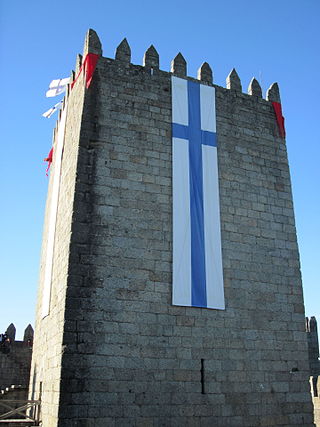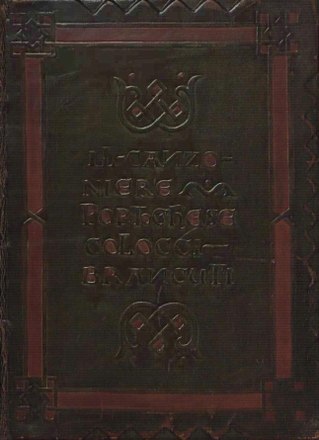
This is a list of troubadours in the Galician-Portuguese language (Galician-Portuguese lyric).

This is a list of troubadours in the Galician-Portuguese language (Galician-Portuguese lyric).

Afonso I, also called Afonso Henriques, nicknamed the Conqueror and the Founder by the Portuguese, was the first king of Portugal. He achieved the independence of the County of Portugal, establishing a new kingdom and doubling its area with the Reconquista, an objective that he pursued until his death.

Juan Rodríguez Cabrillo c. 1497 – January 3, 1543) was a Portuguese maritime explorer best known for investigations of the West Coast of North America, undertaken on behalf of the Spanish Empire. He was the first European to explore present-day California, navigating along the coast of California in 1542–1543 on his voyage from New Spain.
This article concerns poetry in Spain.

Andrade is a surname of Galician origin, which emerged in the 12th century as the family name of the knights and lords of the small parish of San Martiño de Andrade, in the municipality of Pontedeume. The first mention of this small territory is to be found in the documentation of the monastery of San Xoán de Caaveiro, and belong chronologically to the 9th century. It was part of the region of Pruzos, which was created as an administrative and ecclesiastical territory of Kingdom of Galicia in the sixth century by King Teodomiro through a document written in Latin called Parrochiale suevum, Parochiale suevorum or Theodomiri Divisio. From the 12th century Pruzos, and therefore Andrade, were integrated into the county of Trastámara that belonged to the lineage Traba, the most powerful Galician family. By this same time the family group: Fortúnez, begins to unite their names Andrade as surname, since in this parish their family home was located. The knights of Andrade were faithful vassals of their lords the Counts of Trastámara throughout the middle centuries of the Middle Ages.
Correia is a surname of Portuguese and Galician origin, also spelled correia variant became Correia. Origin: Latin corrigia. Correia and Correa and Correya are found throughout all of Portugal and Spain.

The Battle of São Mamede took place on 24 June 1128 near Guimarães and is considered the seminal event for the foundation of the Kingdom of Portugal and the battle that ensured Portugal's independence. Portuguese forces led by Afonso Henriques defeated forces led by his mother Teresa of Portugal and her lover Fernão Peres de Trava. Following São Mamede, the future king styled himself "Prince of Portugal". He would be called "King of Portugal" starting in 1139 and was recognised as such by neighbouring kingdoms in 1143.
Soares is a common surname in the Portuguese language and Galician, namely in the Portuguese speaking world, as well as other places. It was originally a patronymic, meaning Son of Soeiro. It is equivalent to the Spanish surname Suárez. Notable people named Soares include:

Cantiga de amigo or cantiga d'amigo, literally "friend song", is a genre of medieval lyric poetry, more specifically the Galician-Portuguese lyric, apparently rooted in a female-voiced song tradition native to the northwest quadrant of the Iberian Peninsula.

Melgaço is a municipality in the district of Viana do Castelo in Portugal. The population in 2011 was 9,213, in an area of 238.25 km2. It is the northernmost municipality in Portugal.

The Cancioneiro da Biblioteca Nacional, commonly called Colocci-Brancuti, is a compilation of Galician-Portuguese lyrics by both troubadours and jograes. These cantigas (songs) are classified, following indications in the poems themselves and in the manuscript tradition, into three main genres: cantigas de amigo, cantigas de amor and cantigas de escárnio e mal-dizer.
João Soares de Paiva was a Portuguese poet (trovador) and nobleman; often recognised as the first author in the Galician-Portuguese language. He held lands in northern Portugal near the falls of the river Paiva and also in Aragon, near Monzón, Tudela, and Pamplona, near the border with Navarre, as fiefs of the King of Aragon. While the Aragonese sovereign was in Provence, João's Aragonese territories were invaded by Sancho VII of Navarre. He wrote a cantiga d'escarnho entitled Ora faz ost'o senhor de Navarra attacking the king of Navarre for this.
Paio Soares de Taveirós or Paay Soarez de Taveiroos seems to have been a minor Galician nobleman and troubadour active during the second and third decades of the 13th century. He was a brother of the troubadour Pêro Velho de Taveirós. Of his works, six cantigas de amor, three cantigas de amigo, and two tensos survive.

Gonçalo Mendes da Maia, also known as O Lidador, so named for his fearlessness in the struggle against the Saracens, was a Portuguese knight of the time of Afonso Henriques, about whom tradition relates important achievements in the events preceding the independence of Portugal.
Cantiga da Ribeirinha is one of the first known pieces of literature in Galician-Portuguese. The poem's date of composition is debated, with some experts placing it in 1189 or 1198, and others claiming it could not have been written before 1200. It was composed by Paio Soares de Taveirós and received its name because it was dedicated to Maria Pais Ribeira, the mistress of Sancho I of Portugal, known as "Ribeirinha."
João Faras, better known simply as Mestre João, was an astrologer, astronomer, physician and surgeon of King Manuel I of Portugal who accompanied Pedro Álvares Cabral in the discovery of Brazil in 1500, and wrote a famous letter identifying the Southern Cross constellation.

Castle of Loulé is a castle in the municipality of Loulé, in the Portuguese Algarve. Classified a National Monument, since 20 June 1924, three towers remain within the cordon of walls, the remnants of the town hall located within the structure.
Bernal(do) de Bonaval(le), also known as Bernardo (de) Bonaval, was a 13th-century troubadour in the Kingdom of Galicia who wrote in the Galician-Portuguese language.

The siege of Faro occurred when Portuguese forces, under the command of King Afonso III of Portugal, captured the city of Faro in 1249 from the Taifa of Niebla. The event marked the end of Portuguese Reconquista efforts in the Iberian Peninsula.